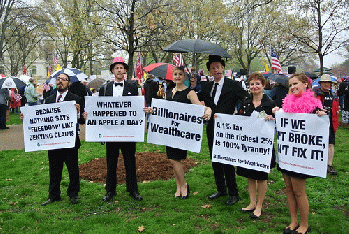Billionaires are not always the most lovable people.
Remember the Silicon Valley venture capitalist who said wealthy Americas were victims of persecution, just like Jews in Hitler's Germany?
Oh, the horrors! Our super-rich are so jeopardized that only three billionaires, Jeff Bezos, Bill Gates and Warren Buffett, are together wealthier than the lower half of our population if we go by a 2017 study. Their fortunes now total about $300 billion.
Highlighting the wealth issue is the entry of yet another billionaire, Michael Bloomberg, into the Democratic race. Bloomberg is spending tens of millions, which will hardly dent his $50-billion-plus.
In the worst way, we're in another Gilded Age. The sheriff of Nottingham might as well have cooked up the U.S. tax system in cahoots with Gordon Gekko. The 400 richest American families in 2018 actually paid a lower rate in combined local, state and federal taxes (23 percent of incomes) than did the bottom half (24.2 percent). Compare that to 47 percent in 1980.
What to do? An outright ban on billionaires, as if that could happen, would be a Soviet-level mistake. I'll explain why while arguing for tougher regulations and far higher taxes on the billionaire class. I even favor a small wealth tax, a much-milder version of what Bernie Sanders and Elizabeth Warren have called for in the spirit of AOC's thoughts on billionaires. And if we could limit the percentage of our economy that each billionaire and his or her family could own or even control via corporations or otherwise--well, that would be wonderful.
Just the same, I respectfully disagree with the wish of Sanders, and others, that billionaires shouldn't even exist someday. I'll demur on the "de-Billionairization" plan of Rob Kall, editor of OpEdNews, who has articulately channeled the thoughts of many understandably furious progressives (here and here). Ahead are my arguments for the continued existence of billionaires, albeit much-better taxed and regulated ones:
Different people respond to different incentives
Commentators like Rob Kall are personally driven by creativity and idealism. But creativity can take different forms.
Kall presumably would focus on the work product--a life-saving drug, better, cheaper electric cars, better solar cells, a worthwhile political manifesto, a poem, a novel, a movie script, or the stress-monitoring device that he invented. But so many of the world's most dynamic business people see the acquisition of wealth itself as at least one form of creativity. They do count their billions and are competitive about it. Elon Musk, Tesla CEO, nailed down a deal that could net him $55.8 billion in a decade.
Can we wave a magic wand and instantly change the business culture to kill off this obnoxious way of keeping score? Likely not.
Remember, we're not the only country where ambitious would-be billionaire-innovators can go. Even the Chinese would love to get in on the action. Chinese Premier Li Keqiang presumably was joking when he offered Musk a green card, but in the case of less established innovators, Beijing can be a lot more serious.
Let us remember, too, the philanthropy that great wealth makes possible. Where would American libraries be without the robber baron Andrew Carnegie?
(Note: You can view every article as one long page if you sign up as an Advocate Member, or higher).






